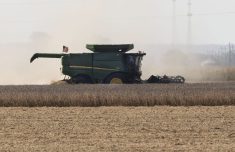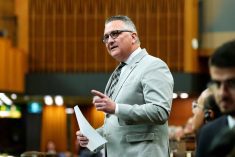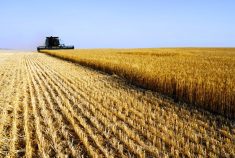Cleanup continues after the worst fire season in British Columbia’s history.
More than 1,300 fires burned 2.96 million acres, according to the B.C. Wildfire Service.
“We are going to have fires burning in some of those areas because of peat. It will flare up over time,” said Kevin Boon, manager of the B.C. cattlemen’s association.
Cattle deaths and property damage are still being assessed and inventory losses may take another month to calculate, he said.
Producers are eligible for $20 million in Agri Recovery funds, as well as other government initiatives to cover livestock, land burnt, fence tallies and other infrastructure losses that are not insured.
Read Also

Alberta harvest wrapping up: report
Harvest operations advanced to 96 per cent complete in Alberta as of Oct. 7, with only a few late-seeded cereal and canola fields remaining, according to the latest provincial crop report.
“I don’t think we will know cattle losses until probably into January because we have got cattle that are 50-60 miles from home and in some rugged country. It will take some snow to drive them out,” he said.
The province provided $2.1 million for highway fencing and has agreed to pay for some of the labour to rebuild private fences at a cost of $4,200 per kilometre.
Most fires were on Crown range and another agreement is expected soon to rebuild fences on public land.
There was a heavy fuel load with dead timber from earlier mountain pine beetle damage and undergrowth. Fires burned so hot the soil in some areas may be sterilized.
n addition, about 5,000 km of fire break needs to be rehabilitated before invasive weeds set in.
“We are talking four or five years to get that back in shape. That is worrisome for us because those invasives move in quick,” he said.
Ranchers want the land reseeded as soon as possible to prevent erosion but they must reach agreements with First Nations groups on what kind of native seed mixes can be used. There may also be a shortage of the correct seed.
Assistance on wildfire recovery is available by contacting www.cattlemen.bc.ca/, or by calling 888 332-3352.
barbara.duckworth@producer.com

















